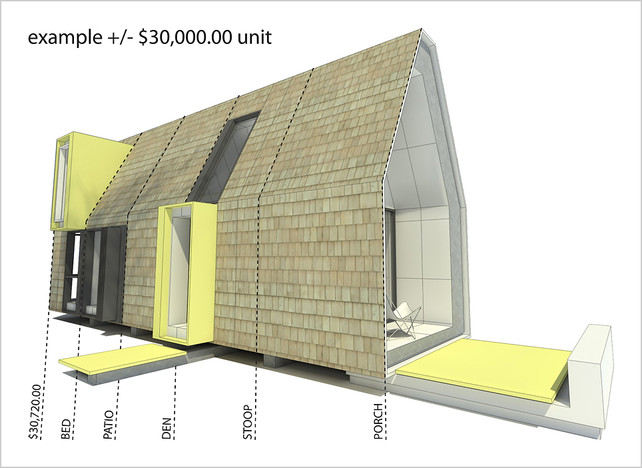Growing Sun Belt cities aren't generally known for their sustainable urban form. But Raleigh, North Carolina is putting the finishing touches on a plan that could break the mold.

Raleigh has been working to overhaul its zoning codes with a plan that hits all the right notes: prioritizing transit-oriented, infill, and mixed-use development. But one particular feature of the plan has really captured the imagination of some local architects.
Raleigh's "Unified Development Ordinance" would allow the development of small residences along alleyways in neighborhoods currently dominated by single-family housing. This proposal would not only make taking up residence in this fast-growing city more affordable, it would dial up Raleigh's sustainability and walkability surely and swiftly.
Inspired by this provision of the plan, local architects David Hill, Erin Lewis and Matthew Griffith of the firm In Situ have developed a sleek modular dwelling design especially for the alleyways of Raleigh. The homes could be had fully equipped for $30,000, or about $200 a month in mortgage costs.
This could be a boon for existing homeowners and all Raleigh residents, the architects told Fast Company Design.
“These new parcels would yield a multiple bottom line. Current landowners could generate income off their excess land by either selling an RA-50 parcel or building a dwelling on one leasing it,” say the architects. “The city would benefit from new utility service units evenly dispersed within an existing downtown infrastructure, generating new income with minimal investment in new infrastructure. Finally, the environmental benefits of a more generous pedestrian environment.”
Raleigh Deputy Planning Director Ken Bowers told Streetsblog that the section of the proposed code that allows for alleyway homes is controversial, and there's no guarantee it will make into the final document and through adoption. But even without this one provision, he said, Raleigh's ordinance will help produce a denser, more walkable, more urban city. Planners hope the new zoning will be adopted by City Council before the end of the year.
Bowers added that more and more traditionally car-centric Sun Belt cities like Raleigh are adopting cutting edge zoning reforms aimed at dialing up livability: notably Memphis and Miami, the latter of which recently adopted a form-based code. The reasons for this are two-fold, he explained. Not only do most Southeastern cities, which came of age after the automobile, have relatively low existing densities, but they have strong enough demand for development that altering zoning regulations will have a big impact on urban form.
"The southeast is probably leading the nation in this stuff," Bowers said.





